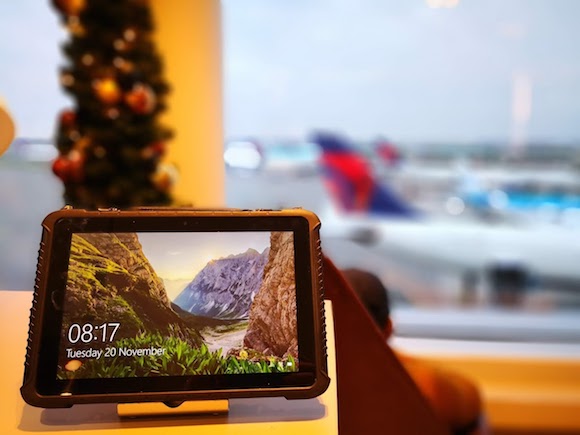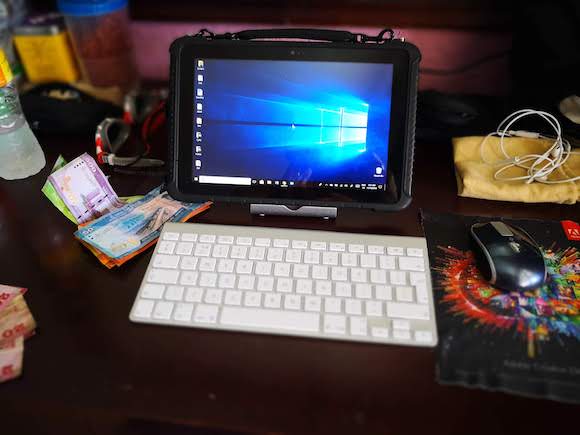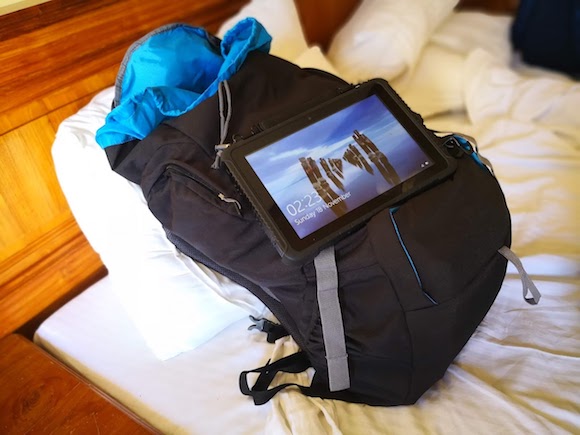The ruggedised reporter, part #1: Conker toughened tablets
The TSA once dropped my laptop and it made me nervous about the fact that a machine on the road is a delicate thing. To be clear, the fine people at the US Transportation Security Administration (TSA) do a fabulous and invaluable job of keeping us safe and I appreciate them right down to their cotton socks.
But, one morning this March in Atlanta Hartsfield-Jackson airport, the screening trays got so backed up that my laptop got literally squeezed out of position and was ejected onto the floor.
Now then, we’re lucky that HP makes its Spectre 360 laptop pretty darn well, because my machine did survive the fall and was easy enough to wipe clean. But the whole experience gave me cause for thought when a trip to Sri Lanka came up this year.
Running through airports, jumping on rickety Sri Lankan trains (some with no windows), traipsing over tea plantations and then trying to sit in cafes at night to write up tech stories and wider experiences… surely there was a better way of computing on the go?
I have always jealously eyed the ‘ruggedized’ (sorry, that should be ruggedised) laptops and tablets that our London gas engineers turn up with. Chunky sides, reinforced plates on the front and nifty ‘easy-grip’ handles. Shouldn’t I be using one of those types of machines on the go?
Time to play Conkers
Enter Conker… well, the Conker brand. This UK-built brand offers a variety of Windows and Android tablets. We chose to play with the Conker NS10 and actually take it on the road to Sri Lanka.
This is a 10″ display rugged Windows tablet with optional barcode scanner. It ships with Windows 10 Pro and it has an optional Intel Core m3 processor. It comes with 4GB of memory and 128GB of storage. There’s a 5.0 megapixel rear camera and a 3.0 megapixel front camera.
The screen is multi-touch sensitive and built is Gorilla Glass for toughness. The drop test rating lists the machine at 1.2 metres. We didn’t drop it, but it’s a whole lot less worrying to slap in down into airport x-ray scanners than a traditional laptop.
The Conker NS10 has Bluetooth and Wi-Fi, but also sports 1 USB port and 1 micro-USB port. We teamed it with a Microsoft wireless mouth and (paradoxically) an Apple wireless keyboard, both worked perfectly with very fast ‘pick up’ i.e. Bluetooth connectivity from a state of rest.
There’s a waterproof built in speaker and microphone, but these are not the machine’s outstanding features. The Conker NS10 weighs in at 1.1kg, but there’s a nice carrying strap on the top.
Usage experience
Okay so how was it? The overall feeling with this machine is that everything ‘just works’ and we mean everything.
Wi-Fi connectivity is strong, connections to external devices are strong, battery life (around 8-10 hours) is good, full-blown Windows functionality in something 10-inches wide is just fine, installation of VPNs and firewalls to enable secure work in remote international locations is perfect… and the rugged factor is there all round in a nice tuff-grip style casing that slid down the side of a backpack very neatly.
NOTE: Exact battery life details state that, ”The NS10 has a 5000 mAh battery and in testing completed 7 hours and 25 minutes of continuous HD video playback at 50% brightness.”
The Conker Windows line comes in 12, 10, 8 and 6-inch screen sizes, but we deliberately chose the 10-inch form factor because it was smaller than a laptop but bigger than a phablet or smartphone size. Writing reports on tiny tables in train stations, airports and cheap hotels worked perfectly.
Official documentation also states that, “These super-tough devices are drop-tested to 1.2m and are waterproof to 1.5m for 30 minutes. They are also completely dust proof and feature toughened screens as standard.”
If there are any criticisms, the product could probably do with a built-in stand for those who want to use it as a rugged PC for most of the time and as a tablet when really on the move. To be fair, Conker does offer mounting stations.
We ended up using an external Anker Portable Multi-Angle Stand, which did the job just fine.
Tough nut to crack?
According to Conker CEO James Summers, the company’s name is inspired by the tough conker nut that comes from the horse chestnut tree and is much beloved of schoolchildren in the playground.
“Like the conker, our business rugged tablet, screen and mobile systems have durable external shells and internal components,” said Summers.
CEO Summers explains that his firm is also focused on UK device engineering that goes some way beyond product features.
“Unlike many of our direct rugged, device-engineering led competitors, Conker is oriented on the effective delivery of business rugged systems to achieve business results. The Conker approach is different, as we are consultative, personal, responsive and flexible — and we always seek to deliver measurable business value,” said Summers.
He further states that Conker is a British producer of business rugged tablet, screen and mobile systems that offers a collaborative approach for mobile workers to improve productivity and make their lives easier by automating the mundane & streamlining business processes.
As a slightly different kind of computing option for a traveller — or a more standard option for a mobile engineering field worker, this Conker device is a really nice piece of kit.
For additional storage, we teamed the Conker device with a Lacie Rugged Secure 2 Terabyte that comes with rain, drop and crush resistance — upon which we installed around 100 movies (you could fit around 500 movies on a disk this size), lots of music and backed up all our photos and files.
Apparently you can drive a car over the Lacie products and they still work.
So for all that lumping and jumping around in Sri Lankan tuk-tuk auto-rickshaws, final departure from Colombo airport saw the security scanners leave all our IT equipment (and liquids) in our bags… but anyway, we still felt rugged.

Amsterdam airport – image: Adrian Bridgwater

Kandy Sri Lanka, computing on the go: image: Adrian Bridgwater

Conker in a rucksack – image: Adrian Bridgwater



